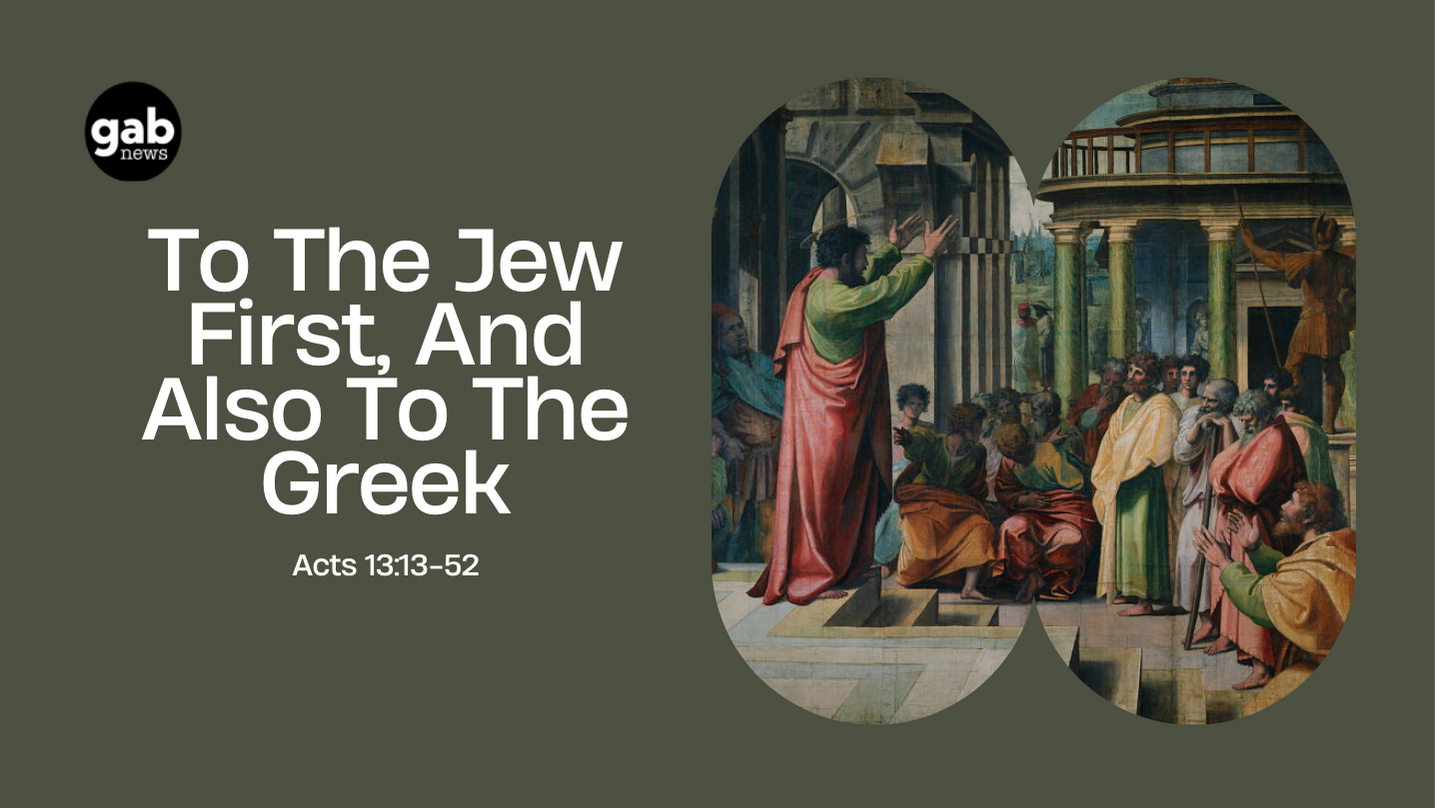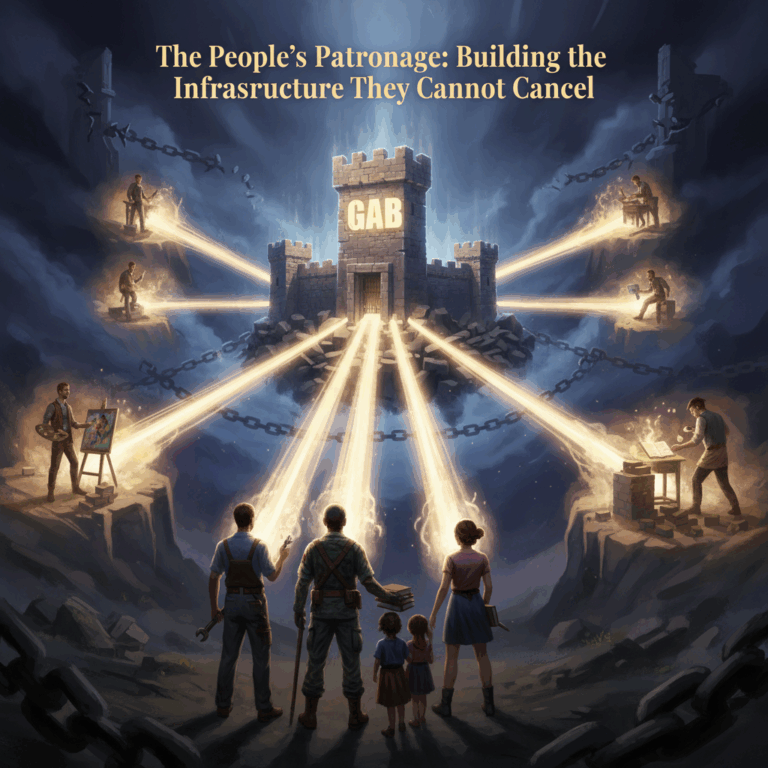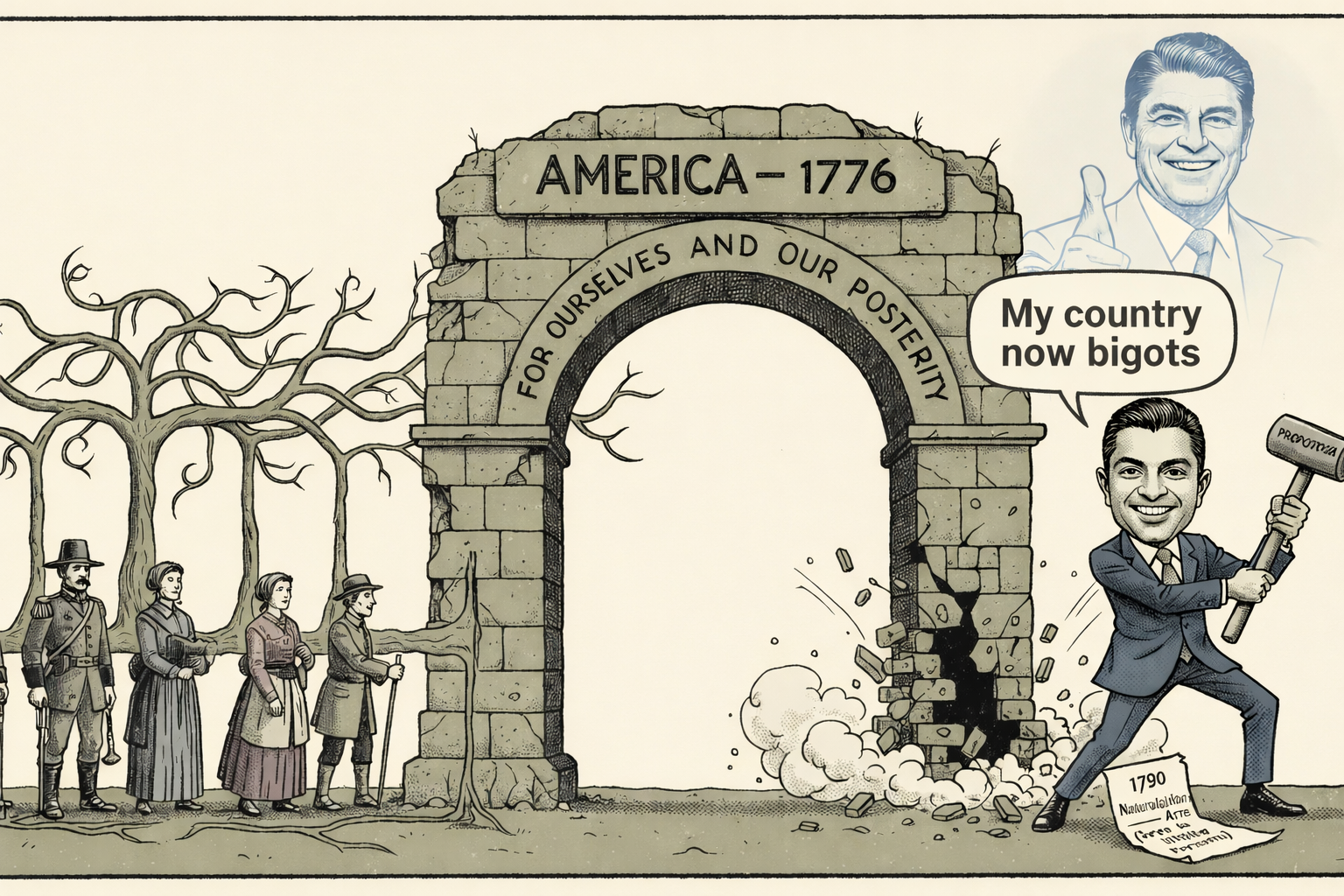Introduction
The pattern of New Testament missionary preaching is laid out in Acts 13. Paul and Barnabas go to the synagogue first, they preach to the Jewish diaspora, and there the New Creation and New Covenant break into and break apart the Old Creation and Old Covenant. Some Jews believe, but the majority reject Paul’s preaching, but their rejection of Christ is set against and actually drives the preaching of Christ to the Greeks who, despite not having all the advantages of the Jews, believe anyway. The belief of the Greeks drives the Jews who reject Christ into envy and rage against Paul and Barnabas, driving them out of the city.
This, here, is the major conflict throughout the entire New Testament in a microcosm. The Old Creation rejects the New Creation and provokes the gospel going out to and saving the other peoples of the world. Just as God used Israel’s rejection of Christ to bring about the salvation of the world in Christ’s crucifixion, God is using Israel’s rejection of the witness of the Holy Spirit to bring about the salvation of the Gentiles.
13 Now when Paul and his party set sail from Paphos, they came to Perga in Pamphylia; and John, departing from them, returned to Jerusalem. 14 But when they departed from Perga, they came to Antioch in Pisidia, and went into the synagogue on the Sabbath day and sat down. 15 And after the reading of the Law and the Prophets, the rulers of the synagogue sent to them, saying, “Men and brethren, if you have any word of exhortation for the people, say on.”
16 Then Paul stood up, and motioning with his hand said, “Men of Israel, and you who fear God, listen: 17 The God of this people Israel chose our fathers, and exalted the people when they dwelt as strangers in the land of Egypt, and with an uplifted arm He brought them out of it. 18 Now for a time of about forty years He put up with their ways in the wilderness. 19 And when He had destroyed seven nations in the land of Canaan, He distributed their land to them by allotment.
20 “After that He gave them judges for about four hundred and fifty years, until Samuel the prophet. 21 And afterward they asked for a king; so God gave them Saul the son of Kish, a man of the tribe of Benjamin, for forty years. 22 And when He had removed him, He raised up for them David as king, to whom also He gave testimony and said, ‘I have found David the son of Jesse, a man after My own heart, who will do all My will.’ 23 From this man’s seed, according to the promise, God raised up for Israel a Savior—Jesus—24 after John had first preached, before His coming, the baptism of repentance to all the people of Israel. 25 And as John was finishing his course, he said, ‘Who do you think I am? I am not He. But behold, there comes One after me, the sandals of whose feet I am not worthy to loose.’
26 “Men and brethren, sons of the family of Abraham, and those among you who fear God, to you the word of this salvation has been sent. 27 For those who dwell in Jerusalem, and their rulers, because they did not know Him, nor even the voices of the Prophets which are read every Sabbath, have fulfilled them in condemning Him. 28 And though they found no cause for death in Him, they asked Pilate that He should be put to death. 29 Now when they had fulfilled all that was written concerning Him, they took Him down from the tree and laid Him in a tomb. 30 But God raised Him from the dead. 31 He was seen for many days by those who came up with Him from Galilee to Jerusalem, who are His witnesses to the people. 32 And we declare to you glad tidings—that promise which was made to the fathers. 33 God has fulfilled this for us their children, in that He has raised up Jesus. As it is also written in the second Psalm:
‘You are My Son,
Today I have begotten You.’
34 And that He raised Him from the dead, no more to return to corruption, He has spoken thus:
‘I will give you the sure mercies of David.’
35 Therefore He also says in another Psalm:
‘You will not allow Your Holy One to see corruption.’
36 “For David, after he had served his own generation by the will of God, fell asleep, was buried with his fathers, and saw corruption; 37 but He whom God raised up saw no corruption. 38 Therefore let it be known to you, brethren, that through this Man is preached to you the forgiveness of sins; 39 and by Him everyone who believes is justified from all things from which you could not be justified by the law of Moses. 40 Beware therefore, lest what has been spoken in the prophets come upon you:
41 ‘Behold, you despisers,
Marvel and perish!
For I work a work in your days,
A work which you will by no means believe,
Though one were to declare it to you.’ ”
42 So when the Jews went out of the synagogue, the Gentiles begged that these words might be preached to them the next Sabbath. 43 Now when the congregation had broken up, many of the Jews and devout proselytes followed Paul and Barnabas, who, speaking to them, persuaded them to continue in the grace of God.
44 On the next Sabbath almost the whole city came together to hear the word of God. 45 But when the Jews saw the multitudes, they were filled with envy; and contradicting and blaspheming, they opposed the things spoken by Paul. 46 Then Paul and Barnabas grew bold and said, “It was necessary that the word of God should be spoken to you first; but since you reject it, and judge yourselves unworthy of everlasting life, behold, we turn to the Gentiles. 47 For so the Lord has commanded us:
‘I have set you as a light to the Gentiles,
That you should be for salvation to the ends of the earth.’ ”
48 Now when the Gentiles heard this, they were glad and glorified the word of the Lord. And as many as had been appointed to eternal life believed.
49 And the word of the Lord was being spread throughout all the region. 50 But the Jews stirred up the devout and prominent women and the chief men of the city, raised up persecution against Paul and Barnabas, and expelled them from their region. 51 But they shook off the dust from their feet against them, and came to Iconium. 52 And the disciples were filled with joy and with the Holy Spirit.
Acts 13:13-52
Paul Preaches in Pisidian Antioch (13:13-41)
Paul, Barnabas, and John Mark left the island of Cyprus and sailed to the south-central coast of Asia Minor just north of Cyprus and arrived at the port city of Perga. John Mark leaves them for unknown reasons to return home to Jerusalem. They traveled from Perga inland to the north to another Antioch in the region of Pisidia in central Asia Minor. There on a sabbath day (Saturday), they arrive in the synagogue of Antioch and join the Jews there. They sit and listen to the readings of the Law and the Prophets, and afterward, the leaders of the synagogue ask them to speak. And there Paul preaches.
Paul begins his sermon addressing them as the “men of Israel” and “you who fear God.” These are two different categories of people. Jews and Gentile God-fearers. Paul starts with the history of Israel, that God chose Israel from the nations of the world and exalted this nation even when they were slaves in Egypt by bringing them out of slavery with the mighty hand. Paul points to God’s patience with how rebellious and wicked Israel was in the wilderness, that God put up with them for forty years. Paul goes on to point out that it was God who destroyed the seven nations of the Canaanites to give them the promised land.
Paul continues with Israel’s history, reminding them that God was with them for 450 years, leading them with judges until Israel demanded a king. Just as God put up with Israel for 40 years in the wilderness, God put up with Saul (and rebellious Israel) for 40 years, until He removed him and gave them David.
Paul is going through all this not merely to give a recitation of history that these men all already know like the back of their hands, he’s telling them all this to set up the importance of David and the promises God made to David and what they mean for them at that time. From this man’s seed is the main point he is making. From David, the savior of Israel and the whole world would come. And that savior is Jesus!
Paul points out that John appeared preaching in the wilderness and washing the people in the Jordan River for repentance of sins. The people thought John might be the savior, but John told them that it was not him but one who would come after him.
From here Paul addresses them again as sons of Abraham and god-fearing Gentiles and tells them the word of salvation has finally come to them. The people of Jerusalem and their rulers did not know Jesus, nor did they know the voices of the prophets that they heard every Sabbath. Why didn’t they know them? Because they fulfilled the prophet’s words by killing Jesus. Despite Jesus having done nothing deserving of death, they demanded that Pilate put Him to death.
And after this, they took Him down from the tree and put Him in a tomb, but God raised Him from the dead. And this was a public event. Many witnesses saw Him raised from the dead from Galilee to Jerusalem. And Paul and Barnabas are now in Antioch to tell them all about this good news—that the promise made to their fathers has now been fulfilled.
Paul then goes on to give evidence from the scriptures. He cites Psalm 2, that Psalm of David—which every Jew knew and sang regularly—that Psalm is about Jesus. God is giving the nations of the world to His Son, and breaking them with a rod of iron.
He cites Isaiah 55, and the quote he gives is interesting because look at the immediate context:
3 Incline your ear, and come to Me.
Hear, and your soul shall live;
And I will make an everlasting covenant with you—
The sure mercies of David.
4 Indeed I have given him as a witness to the people,
A leader and commander for the people.
5 Surely you shall call a nation you do not know,
And nations who do not know you shall run to you,
Because of the Lord your God,
And the Holy One of Israel;
For He has glorified you.”
What is that about? It is about Jesus coming and God going to whom? The Gentiles—a nation you do not know and nations who do not know you. Well, look what happens in the rest of this passage. The synagogue rejects the gospel and the Gentiles flock to Paul and Barnabas. Just in their actions, they are fulfilling this prophecy of Isaiah.
Paul quotes another Psalm, Psalm 16, another Psalm of David. In it, David writes, “You will not allow your Holy One to see corruption.” Paul makes the point that David died, he was buried, and his body did decay. So what David wrote about here can’t be about him. So who is it about? It is about Jesus whose body did not decay but was raised from the dead.
The last passage Paul cites is Habakkuk 1:5 from the Septuagint. This passage is a warning. Habakkuk is warning Israel that they must repent or they will be destroyed by a powerful Gentile nation sent by God in judgment. That prophecy had its near fulfillment in the Babylonians coming and destroying Jerusalem. But what is Paul’s application here? It is the same as Jesus’ own prophecy that Jerusalem will be destroyed in that generation. And this indeed did happen. What was spoken of in the prophets indeed came upon Israel once again.
The Gospel Brings Conflict (v. 42-52)
As the synagogue service ended, the God-fearers begged Paul to tell them more about these things the next Sabbath. Many of the Jews and Gentile God-fearers followed Paul, receiving instruction from them.
But the next week conflict begins. Multitudes from the entire city came to hear God’s Word. All the Gentile God-fearers had told everyone they knew about what they had heard and the Gentiles were ready to receive the gospel. You can imagine this scene, massive crowds everywhere, the synagogue had never seen anything like this. And the unbelieving Jews were filled with envy. What exactly did they envy? They envied that the Gentiles were receiving God’s grace. They envied Paul and Barnabas following and attention from the Gentiles. They were upset and angered that their position and circumstances were being threatened by this movement. And so what did they do? They argued with Paul, they opposed everything he said and tried to pick it apart, they blasphemed Jesus. They viewed Paul as an enemy.
But what did the Spirit do with Paul and Barnabas when this happened? Did He make them meek and mild and give them the desire to compromise and make peace? Did He make them winsome? Did they try to find a third way so that everyone could just get along? No, the Holy Spirit made them bold. And they rebuked the leaders of the synagogue. “It was necessary that the word of God should be spoken to you first. But since you reject it, and judge yourselves unworthy of everlasting life, behold, we turn to the Gentiles.” God set you apart to be given the oracles of God, to have unique covenant promises with Him, but you have decided you do not want Him, so we will go to a people who do not know Him. There Paul quotes from Isaiah 42, showing that this was always God’s plan. That Israel would reject the Gospel and thereby the salvation of the Gentiles would be accomplished.
And remember, this is all in front of massive crowds of Gentiles. And the Gentiles hear this and are filled with gladness and joy over it. These people who did not know God’s word now glorified God’s word. And many were saved that day. And not just in that city but the entire region.
In reaction to this, the Jews stirred up the leaders of the city to persecute Paul and Barnabas and to kick them out of Pisidia. But Paul and Barnabas followed the commandment of Jesus and shook the dust off their feet and went on to the next place, Iconium. But even after they were gone, the church in Antioch was firmly planted and the disciples there were filled with joy and the Holy Spirit.
Conclusion
This passage illustrates the entire conflict of the New Testament. Paul and Barnabas went to the Jews first and preached to them. Some believed, but ultimately Christ was rejected by His own people. But because of that rejection, the word of God went out to the Gentiles and many of them were saved. This is one of the main points that Paul makes in the Book of Romans. In that epistle, Paul is defending God, pointing out that God is still just in using Israel’s rejection of Christ to accomplish the salvation of the world. In the First Century, when the New Covenant had come but the Old Covenant still stood, the people set apart to God in the Old Covenant rejected Christ leading to the nations that did not know Him being brought to the faith.
When we look at the First Century situation and compare it to our own day, we might think, well the Old Covenant has been gone for nearly 2000 years, so how can we apply what God did then to our world today? Well, to begin with, God operates in history typologically. Even when circumstances are not exactly the same, similar patterns happen.
In our own day, Americans are just as zealous for their religion as the synagogue leaders of Antioch. And that religion they often don’t even understand in such terms. Their religion is a political theology. They devoutly believe in democracy, equality, individualism, feminism, and consumerism as strongly as any First Century Jew believed in their traditions. The Gospel of Jesus Christ is just as much a threat to that religion as it was to the religion of the scribes and Pharisees. The Gospel of Jesus is that Jesus Christ is raised from the dead, enthroned as king of the world, and all those who believe in Him are saved from their sins. The adherents of this American Political Theology are fine with a personal private Jesus who saves you privately from your sins, but they cannot bear the idea of a Jesus who is king of the world and Lord of all, for Whom every knee shall bow and tongue confess. They cannot bear a public Jesus that is in opposition to their way of life.
Just this week, an acquaintance of mine, a Baptist pastor in Oklahoma named Dusty Deevers, who was elected to the Oklahoma State Senate this year has been attacked by Rolling Stone and on The Tonight Show. What was he attacked for? He has proposed bills to the Oklahoma senate that outlaw all abortion, criminalize the distribution of pornography, punish adultery, and end the practice of no-fault divorce. He has proposed laws that Oklahoma and all the states in our country used to have, before the new American religion took root. And this is a nation-wide scandal.
Why? Because of the gospel of Jesus Christ, the fact that Christ is King and his kingship brings peace and order when His people submit to His rule. The majority of Oklahomans are evangelical Christians. It makes perfect sense that they would live under Christian laws. But this is untenable to those who worship false gods. Even many Christians are totally scandalized by someone who would uphold the marriage covenant with civic power. And the irony is, those Christians are behaving like the leaders of the synagogue of Antioch.
And what’s more, what results from bold, Christian faithfulness, like that of Paul and Barnabas? Many people, who do not know the Lord are encountering Christ in a way they never have, many of whom have been ground into dust and oppressed by the new religion of American Political Theology, and they are seeing that Jesus Christ is the answer to their problems. These people are like the Gentiles who flocked to hear what Paul had to say. There are millions of people in our country just like them, totally ready to hear the gospel, just as the Gentiles in the First Century were, the only thing they need is bold, faithful Christians to declare that Jesus Christ is king.
So the charge to you this day is this: to understand that you are indeed living in a world more similar to the First Century than you realize and that your faith in Christ is a public faith, a faith that turns the world upside down, and our world, is so badly in need of being turned upside down. Just by living faithfully, by following Christ, repenting of sin, and trusting in Him day by day, you are shaking the dust off your feet from a world that despises and rejects Him. And by boldly living for Christ in this day, many who do not know Him, that He has prepared for salvation, will come to know the Lord Jesus Christ. In the name of the Father, the Son, and the Holy Spirit. Amen!

Andrew Isker is the pastor of 4th Street Evangelical Church in Waseca, MN. He is a graduate of Minnesota State University and Greyfriar’s Hall Ministerial Training School, and he has served churches in Missouri, West Virginia, and Minnesota. He is the author (with Andrew Torba) of Christian Nationalism, and the author of the forthcoming book, The Boniface Option. Andrew, his wife Kara, and their five children reside in his hometown of Waseca, MN. He can be found on Gab @BonifaceOption.





